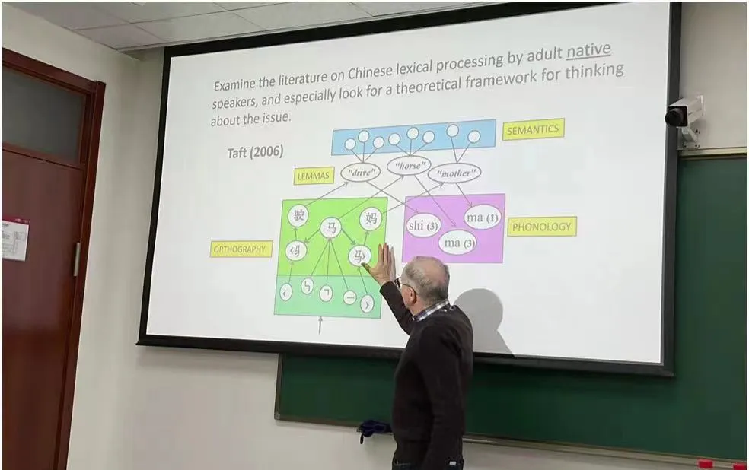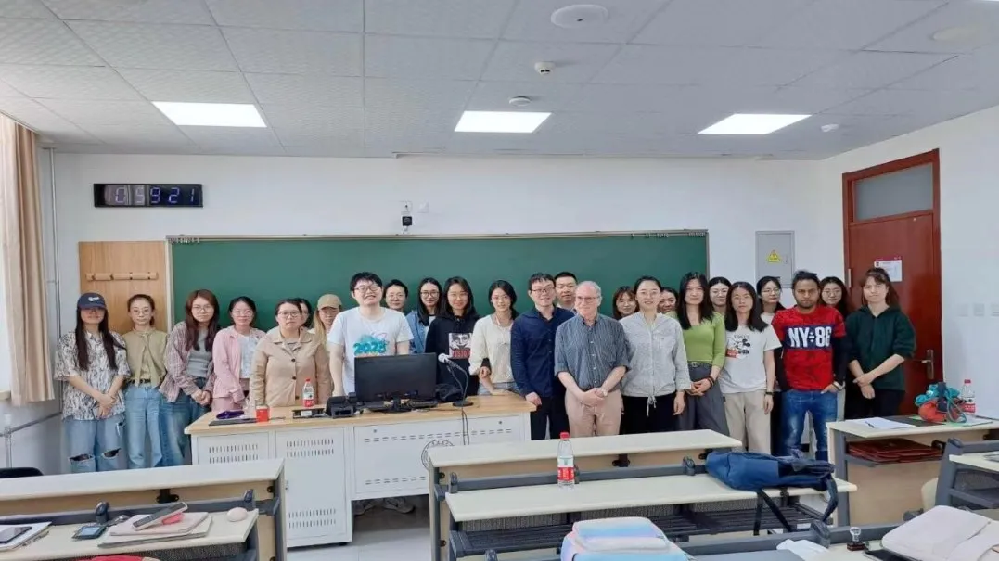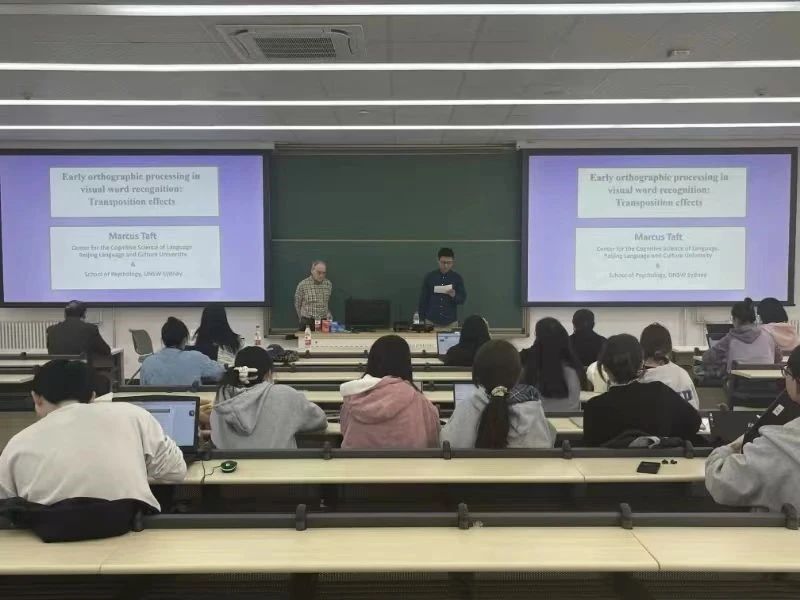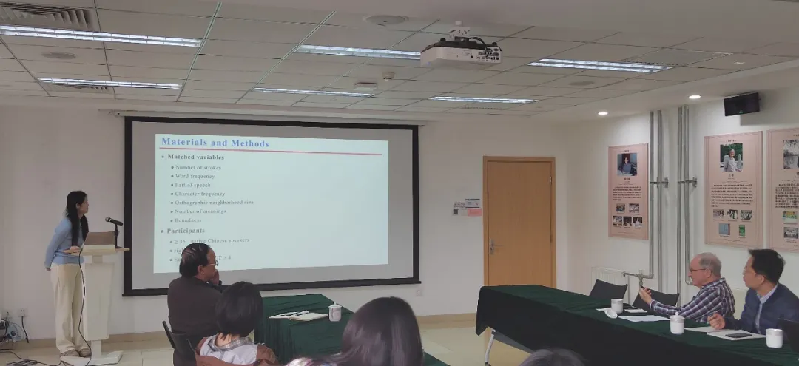From March 25 to April 23, 2024, Professor Marcus Taft, a Distinguished Professor at the Innovative Talents Introduction Base of Linguistic Cognitive Science and a retired professor from the University of New South Wales in Australia, conducted a month-long research residency at the base. During his residency, Professor Marcus Taft carried out various academic exchange activities and successfully completed the research residency plan.
I. Delivering an International Course for Graduate Students
Professor Marcus Taft offered an international graduate course titled "Experimental Design and Research". Taft Professor carefully designed the teaching content, which was divided into three main topics: "Researching the cognitive psychology of language", "A Difference in English Lexical Processing between Native Speakers and Chinese-English Bilinguals", and "Phonological involvement when reading silently for meaning".
In his lectures, Professor Taft mainly introduced the cognitive representations and models in the language learning process, discussed the differences in English lexical processing between native speakers and second language learners, and briefly explained how phonological information is extracted during silent reading. Professor Taft highlighted the cognitive model for processing Chinese characters and emphasized that "Lemmas" connect the orthography and pronunciation of Chinese characters, playing a regulatory role between their form and function.
The content of Professor Taft's graduate course was rich, profound yet easy to understand, and humorous, greatly broadening the research ideas and academic horizons of teachers and students.


II. Delivering Two Academic Reports
During his residency, Professor Marcus Taft delivered two excellent academic reports to teachers and students of our university.
On April 3, Professor Taft's first report was titled "Early Orthographic Processing in Visual Word Recognition: Transposition Effects". He introduced the simplest model and slot coding model of early orthographic processing in visual word recognition and their respective limitations, and elaborated on the transposition effect in alphabetical language lexical recognition. Professor Taft briefly discussed the subsyllabic processing theory (SSP) proposed by him and his collaborators, comparing it with the basic orthographic syllabic structure theory (BOSS) proposed earlier, and proposed further test directions for the subsyllabic processing theory. Professor Taft pointed out the phenomena and issues that need special attention in the research on character transposition effects in Chinese.
On April 17, Professor Taft's academic report was titled "A Difference in English Lexical Processing between Native Speakers and Chinese-English Bilinguals". He first introduced current research on the cognitive neural mechanisms of English lexical processing between native English speakers and English second language learners, and then shared his own research results, arguing that the difference in English lexical cognition between native English speakers and bilinguals is not limited to the extraction of word stems. Professor Taft proposed the concept of "boss advantage", arguing that native English speakers always combine the consonants of the first and second syllables when cognitively processing English words, and supported this with relevant experimental results.
The content of Professor Taft's two lectures was detailed and progressive, leading everyone into the world of lexical recognition and processing. During the Q&A session, Professor Taft answered questions in detail and explored the topics in depth, inspiring and benefiting the participating teachers and students.

III. Participating in the Academic Symposium
From April 2 to April 9, the base held two academic symposiums for teachers and students, with Professor Taft invited to participate. Professor Wang Jianqin, the director of the base, and several other teachers attended the symposiums.
During the symposium, graduate students from the base actively participated and shared their individual research. In the first session, Doctoral student Hao Yuanyuan presented a report titled "How conventionality, context, and working memory influence Chinese metaphor processing: Evidence from ERP." She elaborated on the research background, current issues, and methodology, proposing research hypotheses and experimental designs. Master's student Chen Xinyi presented "Does Word Order Background Affect Chinese L2 Learners' Non-canonical Sentence Comprehension?—An fMRI study," exploring the influence of L2 learners' native language background on their comprehension of non-canonical Chinese sentences through two progressive experiments. Master's student Wang Qiong presented a report titled "The Influence of Contextual Information on Metaphorical Processing Mechanism," introducing the use of fMRI technology to investigate the influence of contextual information containing target and source domain features on metaphorical understanding among native Chinese speakers.
In the second session, Doctoral student Wang Huiping reported on "The Neural Mechanisms of Fossilization in Chinese L2 Learners' Syntactic Processing," introducing concepts such as "fossilization," "critical period," and "implicit and explicit learning," pointing out existing issues in research and presenting research ideas and plans. Master's student Lin Lin presented a report titled "A Study on the Neural Mechanisms of Auditory Modalities in Disyllabic Compound Words—An Experiment Design," focusing on Chinese compound words, using neuroimaging analysis techniques to investigate the effects of transparency and word frequency on the processing of Chinese compound words. Master's student Xie Shiyang presented a report titled "The effect of the semantic relatedness between disyllable words and their constituents during visual word recognition," providing a detailed introduction to experimental designs and other research content.
The symposium was held in a lively atmosphere, with Professor Taft and faculty members providing detailed feedback and discussions on the presentations, offering valuable suggestions on experimental design, material control, and other aspects. Professor Taft expressed his pleasure in participating in the student-faculty symposium and was deeply impressed by the excellent performance of the students. Participating faculty and students expressed that they had gained much from the event.

IV. Jointly supervise graduate students and conduct collaborative research with researchers from CCSL
During his stay at CCSL, Professor Taft not only visited classrooms and participated in group meetings of various research teams to jointly guide graduate students in academic research. He also enthusiastically engaged in in-depth academic exchanges with graduate students, providing valuable academic guidance and suggestions on conducting experimental research, writing experimental papers, and conducting data analysis. The graduate students at the base gained valuable cutting-edge academic knowledge, enriching their academic experience and enhancing their international academic vision. They also gained greater interest and motivation for future scientific research.
Professor Taft conducted in-depth academic exchanges with multiple researchers at the base, participating in collaborative research on some research projects. He made substantial contributions to enhancing CCSL's research level and producing high-quality academic achievements. Professor Taft successfully completed his residency at the base.
